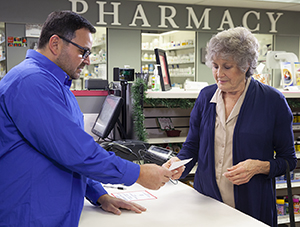Taking Medicine to Control Heart Failure
The heart is a muscle that pumps oxygen-rich blood to all parts of the body. When you have heart failure, the heart can't pump as well as it should. Blood and fluid may back up into the lungs (congestive heart failure). As a result, some parts of the body won’t get enough oxygen-rich blood to work normally. These problems lead to the symptoms of heart failure.
Your healthcare provider may use the term "ejection fraction" as a way to describe the type of heart failure you have, or as a measure of how well your heart pumps. Ejection fraction is the percentage of blood that's pumped out of the left ventricle of the heart compared with how much blood the ventricle can hold. A normal value is between 50% and 70%.
Medicines can help your heart work better. But follow your healthcare provider's directions exactly to make sure they work as they should.
 |
| Have all your prescriptions filled. Talk to a pharmacist if you have questions. |
Why take your medicines?
-
They help you feel better. That means you can do more of the things you enjoy.
-
They help your heart work better.
-
They can help you stay out of the hospital.
-
They can prevent shortness of breath and swelling in your feet.
-
They can improve blood flow to the rest of your body and prevent other organs from being affected.
-
They may even prevent heart attack or death.
Know your medicines
You may take 1 or more of the medicines below. Your healthcare provider will work with you to find the best mix of medicines for you. Be sure you know which ones you take:
-
ACE inhibitors. These lower blood pressure by acting on the kidneys and ease strain on the heart. This makes it easier for the heart to pump. These medicines also help remodel the heart, which can help your heart pump better.
-
Angiotensin receptor blockers (ARBs). These work like ACE inhibitors. They're prescribed for some people who can't take ACE inhibitors. Some people who take ACE inhibitors get a persistent cough or other bad reaction and may need to switch medicines.
-
Angiotensin receptor neprilysin inhibitor (ARNI). This medicine combines an ARB and a neprilysin inhibitor. It helps relax blood vessels and reduce stress on the heart. It also helps your body get rid of salt and fluid.
-
Beta-blockers. These medicines help lower blood pressure and slow your heart rate. This eases the work on your heart. Beta-blockers may improve the heart’s pumping action and strength over time. If you have severe lung disease, you may not be able to take these medicines.
-
Sodium-glucose cotransporter-2 (SGLT2) inhibitors. These treat heart failure in people who have reduced ejection fraction. They ease the strain on the heart by blocking the kidneys from reabsorbing sugar from the blood. This helps your body get rid of extra salt and water. So it lowers your blood pressure. These medicines were originally made to help manage diabetes. If you have heart failure, your provider may prescribe an SGLT2 inhibitor if other medicines aren't working.
-
Diuretics (water pills). These help the body get rid of extra water by getting rid of salt. This helps prevent swelling, especially in your ankles. They can also help you breathe better if you have fluid in your lungs. Having less fluid to pump means your heart doesn’t have to work as hard. A side effect of this medicine is having to pee more often. Some diuretics make your body lose a mineral called potassium. Your healthcare provider will tell you if you need to take supplements or eat more foods high in potassium. Other diuretics hold on to too much potassium. This can cause your heart to have arrhythmias. It's important to understand which medicine you're on and how it affects your potassium levels.
-
Aldosterone blockers. These help change hormone levels to help your body get rid of salt and water through the kidneys and ease strain on the heart.
-
Hydralazine and nitrates. These medicines are used together to treat heart failure. They may come in 1 combination pill. They lower blood pressure and decrease how hard the heart has to pump.
-
Digoxin. This helps your heart pump with more strength. This helps your heart pump more blood with each beat. So more oxygen-rich blood travels to the rest of the body. This may be used when other medicines don't give enough symptom relief.
-
Sinus node I(f )channel blocker. This is used to reduce heart rate, which puts less stress on the heart.
-
Vericiguat. Helps reduce heart failure hospitalizations for certain types of heart failure.
-
Statins. These medicines lower the amount of bad cholesterol in your blood. This improves the health of your blood vessels. While they aren't used to treat heart failure, your healthcare provider may prescribe a statin if you have high cholesterol. Or if you've had a past heart attack and are at risk for heart failure.
Tips for taking your medicine
-
Take your medicines exactly as directed. Follow the directions on the label.
-
Take your medicines at the same time or times each day.
-
If you miss a dose, take it as soon as you remember—unless it’s almost time for your next dose. If so, skip the missed dose. Don't take a double dose.
-
Never change the dose or stop taking a medicine unless your healthcare provider tells you to. Tell your provider if you don't understand how to take your medicines. Also tell them if you're having trouble getting your medicines.
-
If you miss too many doses, you're at risk for being admitted to the hospital for shortness of breath and worsening heart failure symptoms.
© 2000-2025 The StayWell Company, LLC. All rights reserved. This information is not intended as a substitute for professional medical care. Always follow your healthcare professional's instructions.